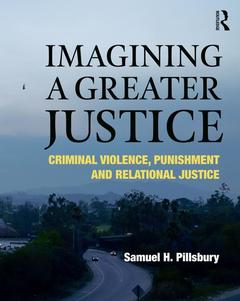Imagining a Greater Justice Criminal Violence, Punishment and Relational Justice
Auteur : Pillsbury Samuel H.

Even for violent crime, justice should mean more than punishment. By paying close attention to the relational harms suffered by victims, this book develops a concept of relational justice for survivors, offenders and community. Relational justice looks beyond traditional rules of legal responsibility to include the social and emotional dimensions of human experience, opening the way for a more compassionate, effective and just response to crime.
The book?s chapters follow a journey from victim experiences of violence to community healing from violence. Early chapters examine the relational harms inflicted by the worst wrongs, the moral responsibility of wrongdoers and common mistakes made in judging wrongdoing. Particular attention is paid here to sexual violence. The book then moves to questions of just punishment: proper sentencing by judges, mandatory sentences approved by the public, and the realities of contemporary incarceration, focusing particularly on solitary confinement and sexual violence. In its remaining chapters, the book looks at changes brought by the victims' rights movement and victim needs that current law does not, and perhaps cannot meet. It then addresses possibilities for offender change and challenges for majority America in addressing race discrimination in criminal justice. The book concludes with a look at how individuals might live out the ideals of a greater?relational?justice.
Chapter 10 of this book is freely available as a downloadable Open Access PDF at http://www.taylorfrancis.com under a Creative Commons Attribution-Non Commercial-No Derivatives (CC-BY-NC-ND) 4.0 license.
Introduction; Acknowledgments; Part 1: Judging Wrong 1. Violence and the Soul 2. Blaming for Moral Disregard 3. Misjudging Wrong Part Two: Just Punishment 4. Punishing with Regard 5. Cruelty by Law: Mandatory Life in California 6. Our Prisons, Our Prisoners: Cruelty in Penal Practice Part 3: Relational Justice 7. Victims and Justice under Law 8. Victims and Relational Justice 9. Redeeming the Responsible 10. Healing the American Community: Race and Criminal Justice 11. Living a Larger Justice
Samuel H. Pillsbury is Professor of Law and Frederick J. Lower Fellow at Loyola Law School, Los Angeles. He teaches criminal law, criminal practice and American legal history. A nationally recognized scholar in criminal responsibility, punishment and emotion and the law, his previous books include JudgingEvil: Rethinking the Laws of Murderand Manslaughter and How Criminal Law Works. After college, Pillsbury was a reporter covering police and courts in North Florida. He then earned his law degree at the University of Southern California, where he graduated first in his class. He clerked for US District Judge William Matthew Byrne, Jr., and served as an Assistant United States Attorney in Los Angeles before going into teaching. In 2006 he was ordained as an Episcopal deacon. He has volunteered as a chaplain in LA juvenile detention halls and jails, as well as prisons in California and New York. He has also worked with survivors of homicide and families with loved ones in prison.
Date de parution : 01-2019
18.7x23.5 cm
Date de parution : 01-2019
18.7x23.5 cm
Thèmes d’Imagining a Greater Justice :
Mots-clés :
Young Man; English Premier League; Crime; Racial Terrorism; Violence; Good Life; Punishment; California Prisoner; Individual Responsibility; Prison Rape Elimination Act; Collective responsibility; Capital Punishment; Justice; Murder Offense; Racial bias; Mandatory Minimum Penalty; Mass incarceration; Victim Impact Statements; Criminal justice reform; Violate; Restorative justice; Victim Impact Testimony; Criminal Street Gangs; Child Sexual Abuse Scandals; Mandatory Life Sentences; Moral Regard; Wrongful Violence; Relational Justice; Offender Reformation; Moral Disregard; Headline Cases; Long Trail; Juvenile Murderers; Rape Kits



